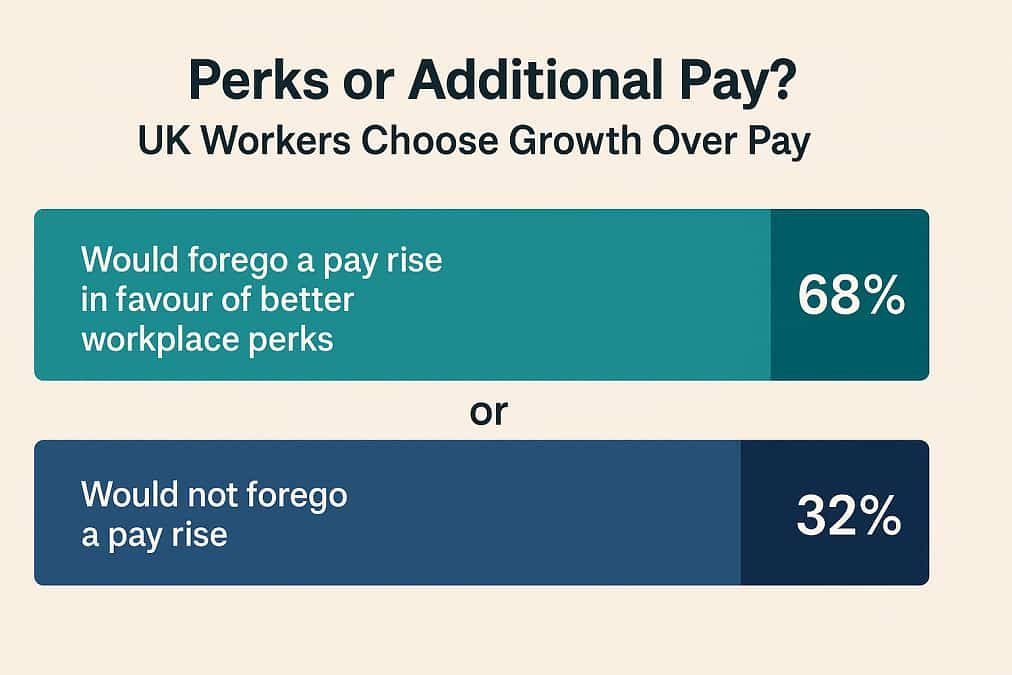In an era where economic uncertainty and rising living costs continue to dominate the headlines, it might seem astonishing that the majority of UK workers would consider giving up a pay rise in favour of something else entirely — better workplace perks. Yet, according to a recent report from recruitment specialists Robert Half, almost seven in ten employees across the UK say they would trade additional pay for meaningful professional workplace training development opportunities.
The study reveals that today’s UK workforce is far more focused on career progression, learning and personal development than traditional financial incentives. Rather than gym memberships or free breakfast bars, employees want access to training programmes, leadership development, and digital skills education, particularly in emerging areas like artificial intelligence (AI) and data literacy.
This marks a significant shift in worker priorities. Research by LinkedIn supports this trend, indicating that employers are increasingly hiring based on skills rather than experience, showing that the modern workplace is undergoing a quiet revolution — one defined by capability rather than tenure.
A new era of long-term capability building
Robert Half’s data suggests a changing mindset among UK workers. Just three per cent said they would never exchange a higher salary for an opportunity to upskill. This reflects a growing emphasis on long-term employability and adaptability of the UK workforce, where learning is no longer a luxury but a necessity.
Matt Weston, Senior Managing Director for the UK and Ireland at Robert Half, commented:
“The market is now pricing in capability, not tenure. Professionals fluent in data analytics, AI, project leadership, financial strategy and compliance are at the top of employers’ wish lists – and salary bands. Competitive pay still matters, but the best offers now go to those who can drive performance through insight and innovation.”
Weston’s statement underscores the growing demand for skills that drive clarity, speed, and resilience — attributes crucial in uncertain economic conditions. The message is clear: skills define future growth.
The evolving value of workplace benefits
However, not all workplace perks are equally valued. According to research by Epassi UK, some four in ten employers continue to offer company car schemes, yet only seven per cent of staff have used them in the past year. Instead, private medical insurance has risen sharply in importance as employees seek greater security amid ongoing NHS pressures.
A quarter of respondents now rank private healthcare as the most desirable workplace benefit, but only around half of UK employers currently offer it. Meanwhile, hybrid working, once seen as the ultimate post-pandemic perk, remains popular but not dominant — only 24 per cent view it as their top benefit, even though it’s available in 57 per cent of workplaces.
Matt Russell, CEO of Epassi UK, explained:
“Demand for private healthcare insurance continues to rise and employers need to ensure they’re investing in the right benefits to offer the support their workforce is calling for.”
Yet, there is a communication gap. Only 16 per cent of workers believe they have access to private medical care, even when it is provided. Nearly a quarter feel their employer doesn’t care about their wellbeing — a sobering statistic that highlights a wider issue of employee engagement and awareness.
Russell added:
“Many employees remain unaware of the benefits they are eligible for and in too many cases are missing out. Employers need to improve communication to ensure both parties get value for money.”
What this means for UK workers
For many UK workers, this research reflects a rebalancing of priorities. While pay remains an essential factor, the concept of value at work is shifting from immediate financial reward to sustainable career investment. Workers are increasingly looking for employers who invest in their future — through training, education, and wellbeing support.
For employers, the message is equally clear. To attract and retain top talent in a competitive labour market, pay alone is no longer enough. Companies must offer growth, learning and wellbeing opportunities that align with workers’ evolving expectations.
As The Workers Union continues to champion the needs and aspirations of the UK workforce, it’s evident that a new model of employment is taking shape — one where skills, care, and communication form the foundation of a stronger, more resilient labour market.
For UK workers, the question is no longer just “How much am I paid?” but rather, “How far can I go with the skills I’m given?”




